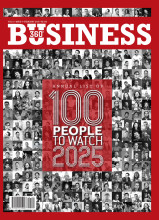
Dr. Prativa Pandey, Founder and CEO of Catalyst Technology and Herveda Botanicals, is a researcher and science entrepreneur. Her research is focused on the value addition of Medicinal and Aromatic Plants (MAPs) of Nepal. She is a researcher at Research Institute for Bioscience and Biotechnology and a visiting faculty at RECAST, TU. She completed her MS/Ph.D. in Organic Chemistry from Northwestern University and holds a Management Certificate from the Kellogg School of Management.
She returned to Nepal in 2015 after a decade of research and industrial experience in the US and Singapore leading research teams and supporting technology transfers. She has published several research reports, articles and holds three US patents.
Pandey is working in the intersection of public, academic and private sectors. She is a Council Member in STI Policy Implementation and Promotion Council 2020 (MOEST), Member of High-level Industry and Investment Policy Forum (MOICS), and Board Member of Agriculture Promotion Committee 2020 Nepal-USA, NRNA.
She also co-founded Daayitwa, Nepal Public Service Fellowship in 2012 and is an advisor at Nepal Leadership Academy (NLA). She has co-founded two platforms for women scientists and youth scientists, Women Scientists Forum Nepal (WSFN) and Young Scientists Forum Nepal (YSFN) respectively as an initiation of Nepal Academy of Science and Technology (NAST), Nepal. She is an active member of Intellectual Property Protection Society Nepal (IPPSON), and on the advisory board of Nepal Economic Forum (NEF).
She has received the prestigious UNESCO-OWSD Early Career Fellowship 2019 and NAST-NABIL Science and Technology Award 2019 in recognition of her leadership and excellence in STEM.




I always remind myself that the ecosystem is always greater than an individual. I strongly feel that I can do much better here in Nepal at an ecosystem and impact level.
Coming Back Home
Pandey believes that the ecosystem here is not ready to accept returnees; they feel rejected by it. “I do think that if I were still in the US, I could have done a lot better professionally; but on an individual level. I always remind myself that the ecosystem is always greater than an individual. I strongly feel that I can do much better here in Nepal at an ecosystem and impact level.” she states. She dwells on the matter some more. “There are challenges and I am still dealing with them but I always knew that those challenges exist and that is the reason I knew that I was returning. When I was in the US, I knew that I wanted to work on making the ecosystem stronger in Nepal. Since a young age, whenever I felt a gap, I had the habit of assembling people and getting things done. In a way, I have always been rebellious,” she says and continues, “I knew that I may not get to work as the top scientist in Nepal but I can at least prepare the platform for future scientists to achieve great milestones in the field. In a way, it is sad because had there been a platform for us, things would have been easier for me and others of my generation. Someone had to start and I felt that I should try to be one of them. In chemistry, there is a term called ‘catalyst’. Catalyst is a substance that accelerates reaction rate without it being completely consumed and keeps being regenerated. I feel that we need a critical mass of catalysts to bring accelerated and sustainable impact in Nepal, with persistent efforts.” Moreover, she credits her husband, Pukar Malla, for supporting her journey throughout. It always helps to have an equal partner who understands your aspirations and is invested in your growth as well. The power dynamic between a couple with an educated and financially independent wife has always been different from that espoused by the patriarchal society. Nevertheless, our society is still shackled in the traditional power play which hands more power and authority to the male in a relationship. “It is not about if my husband has more authority than me. It is that the society gives him more authority. At times, I leverage his authority and that of others championing gender equity to lead with informal authority and navigate the system. That’s why, we need both male and female champions for our collective growth and mind-set change. Pukar and I had value level alignment even when we were just friends. The importance of ecosystem and need for platforms in Nepal used to make us restless when we were in the US. Pukar, three other youth and I co-founded Daayitwa Public Service Fellowship in Nepal in 2013. I was still in grad school in the US at that time. We were fellow Nepalis looking to build platforms for Nepali diasporas who wanted to return and work in and for Nepal in their field of expertise.” she informs. Even though coming back to Nepal presents with its share of challenges, she says that she has no qualms. “It is relatively easier to establish companies in Nepal, irrespective of the scale of the business. The same cannot be said of the first generation Nepali immigrants in the US since too many things are at stake, especially financially and due to pressure to maintain legal status. In Nepal, basic requirements are met and once that happens you are in a privileged position. Privilege comes with a responsibility - to think beyond self, to take risks and to support the ecosystem,” she explains. Though she was not sure about how she would lead her career immediately after coming back to Nepal, today along with working as a researcher and scientist, she is also actively involved in improving the science and business ecosystem in Nepal. Hers is a textbook example of how to establish oneself when back home.Too Many Hats
Pandey is 34. That says a lot. She is a member of Science, Technology and Innovation Policy Implementation and Promotion Council at the Ministry of Education, Science and Technology (MOEST). She claims that she is the youngest female member representing the private sector in that committee which also comprises secretaries from all the ministries and is headed by the Minister, MOEST. Even though the committee had other women from academia, she was the only woman representing the private sector. “I was there probably because of my unique disposition as I represent research, academia and industry and only few people are operating in that intersection,” tells Pandey. Policies like providing grants to scientists for their research work, tax benefits to incubation centres, initiating technology transfers - the kind of reforms that can be implemented right away - argue the need of incubation centres and inclusion of academia and private sector in the discussion table. “As a woman, researcher and an entrepreneur, I also brought the lens of gender and inclusivity to the policy implementation plan that was largely lacking in the final policy document itself.” states Pandey. Interestingly, when she brought up the issue during the policy making phase, some strongly objected saying science is entirely merit-based and that there should not be ‘men’ and ‘women’ as such and there is no need to introduce gendered lens in it.“However, my argument was that there are so many micro-biases and hurdles in the society for women who want to pursue a degree and career in STEM, so expecting women to excel without providing the environment conducive to learning and growth is unfair.” she stresses. Pandey states that she was involved in the policy-making process because “if we do not persistently lobby for progressive policies and laws and support the government to make informed and evidence -based policy decisions then there is no use of just blaming the government.” To some extent, she envies the scientists abroad who can just focus and deep dive in the world of research. That is hardly the case in Nepal where the research ecosystem is very fragile. So, she decided to take on the journey of leveraging technological interventions as a researcher to solve market problems as an entrepreneur. Nevertheless, the ‘this’ or ‘that’ dichotomy has plagued the world in more ways than one. One can be both too however onerous the journey is. Pandey is working on translating the knowledge from the lab into industry, something she has hands-on knowledge on while leading teams in the US and Singapore in technology transfer in the semiconductor industry and as a Scientist with the training in Management from one of the top schools in the world. She has earned three patents under her name on her works in semi-conductor. She has also continued her research journey and was awarded 50,000 USD by UNESCO-OWSD to perform research on the value addition of waste fruits. She was recognised by National Academy of Science and Technology (NAST) with NABIL-NAST Science and Technology Award. “At heart I am a scientist and sometimes I wish I could only focus on science but that is not possible to achieve my goal. If you do not just want to work in the individual level but in the ecosystem level, you have to wear different hats.” Something that she feels strongly about is the intellectual property policy. She is also a member of a high level committee for Innovation Promotion in Entrepreneurship. Besides, recently she became a member of the board of advisors of Nepal Economic Forum (NEF) where she will also be supporting topics related to digital transformation.
Girls are not encouraged to fail and try again whereas boys are groomed to pursue success even after multiple failures.
Herveda Botanicals
Pandey defines Herveda Botanicals as highly needed skin care. “Quality skincare is not available in Nepal and there are a lot of harmful chemicals present in the ones that we use. We have ages old indigenous knowledge and high value medicinal plants for skin care; we export highly potent medicinal plants as raw materials at such a cheap price. With such rich knowledge and resources, I believe we deserve to have access to better skincare,” briefs Pandey. “Herveda Botanicals is an example of how we can do this: high quality internationally competitive skincare produced in Nepal from locally sourced raw materials using innovative skincare technology.” Herveda is marketed as a brand that incorporates science, art, storytelling and traditional knowledge. “Essentially, Herveda Botanicals is one of the spin-offs of Catalyst Technology after 3-4 years of research on medicinal plants and alternative medicines like Ayurved and Aamchi. I started Catalyst Technology after mapping resources and possibilities in Nepal for almost two years after returning to Nepal from the US. I was also leading a team of scientists and engineers in Singapore for a global company those two years from Nepal. Then, I quit my job as a scientist in 2017 to start Catalyst Technology with a goal to bring innovative technology and solutions to solve market problems. We plucked the low-hanging fruits and invested initial capital in research and development,” shares Pandey. And that is just scratching the surface. Other research areas that Catalyst is involved in are: Preservatives, Supplements, Extracts and Value Addition of plants. Her work at Catalyst used to take her to Mugu, Surket, Mustang, Myagdi and other districts. During her travel, she saw huge prospects in medicinal plants. Concurrently, through her meeting with farmers, farmer cooperatives and traders, she was informed about the huge gap in supply chain of medicinal plants. Thereupon, she started her research on medicinal plants which led her to believe that skincare is a good way of showing research. “And it can be brought in the market pretty easily. After a research of 3-4 years, Herveda Botanicals was introduced to the world,” briefs Pandey. “Herveda gets the raw materials directly from the farmers and farmer corporative reducing 3-4 middlepersons in the supply chain. Besides, we are planning to source from each of the 77 districts and prepare other sophisticated products. But that requires research and I am hoping for a large innovation venture grant to make it possible at a larger scale. My plan is to make Herveda a bigger thing by bringing research components, working on supply chain gaps, and seeing everything in a holistic way. We source from the farmers but our approach is to also support the farmers technically about what to plant, when to plant, how to plant and how to sustainably harvest medicinal plants,” explains Pandey. Her research on all natural skincare products led her to India where she found well-documented knowledge in the form of ancient texts on Ayurveda. “It kept me wondering why we talk about doing research at the forefront, but have not been able to even institutionalise and capitalise on the already existing knowledge from thousands of years.” She contemplates and adds, “If a company wants to use the raw materials available in the country and produces an innovative product, either there should be tax subsidy or there should be research grant otherwise the companies cannot afford to invest all during the incubation period. For the same reason, things are difficult for innovative companies. We are working really hard to have innovation in the organisational DNA of Herveda Botanicals, so for that reason I am bootstrapping until now and will only bring in stakeholders with whom we have alignment at value and vision level.” Before she started Herveda, like any entrepreneur, she researched on the available skincare products produced from Nepal - those who claim to be ‘made in Nepal’. “With some, their claim is right. But there are only a handful companies which make products in Nepal. But there is no company that I know in Nepal which makes all natural skincare products and has in-house technological innovation capability. Also, there is no skincare company in Nepal I am aware of with a dedicated research and development division except for ours, but we definitely are willing to encourage and support such initiatives,” says Pandey with a whiff of pride. A disciple of contextual innovation, Pandey got herself involved in contextual research instead of continuing semi-conductor research “because we need to contextualise innovation per the need and ability of the country as well. In this age of knowledge economy, if we are not innovative, if we are not banking on knowledge, we will be outdated as a country in the global map and it will be too late. We need to invest in a knowledge economy - on research, on technology, on innovation, on human resource. Herveda and Catalyst are simple cases in point of how we can incorporate innovation in our businesses.”Collaboration not Competition
Pandey is a flag bearer of collaborative works. She opines that collaboration can bring great results. “Bringing out some key products by collaborating with another company and merging the expertise of both the companies would create synergy. It also sends a positive message that we entrepreneurs can work together instead of fearing each other as competition. We can create much higher collective value and strongly position Nepali products in the global market,” says Pandey and quickly clarifies, “It is not a merger of the company I am talking about; but a “merger” of certain creative ideas and concepts that benefit both the companies.” It could also be about sharing resources like the one they are doing with Herveda’s showroom at Jhamsikhel, wherein they have shared the showroom space with another female entrepreneur. “Besides, we are working with Aji’s Products to collaborate on the production of “kon”, a traditional Newari facial and body scrub. Initially, we both had kon in the market with our respective brand names. Instead of competing at national level, we decided to collaborate by sourcing Aji Product’s authentic Newari kon (powder) prepared by their 62-year-old Aji’s maker, Anita Joshi. We then scientifically modify the kon with enzymes and different medicinal herbs to make it both functionally and aesthetically advanced while keeping the integrity of the product and story alive. The final product is co-branded and sold collectively as “Herveda X Aji’s” product. We soon plan to expand our market internationally so that Nepal’s stories and products are known in other countries too,” informs Pandey. Pandey is also a member of Nepal Young Entrepreneurs Forum, a forum officially instituted by the Federation of Nepalese Chambers of Commerce and Industries, “which creates an equal opportunity space and resources for young entrepreneurs. It is a very helpful network,” she says. Another fraternity she is part of is Leaders’ Network which was started on WhatsApp. “We have 56 participants. This is a loose network of female entrepreneurs and leaders that was created to share resources, ideas and opportunities with each other,” she informs. Pandey is especially excited about the changing dynamics among female entrepreneurs in Nepal lately. “Things are changing. We are trying to support each other and collaborate. The social barrier and challenges are changing also because of the continuous push back and efforts of many female entrepreneurs who have struggled before us. We are still far from fair and equitable rights compared to men but we are constantly pushing forward so that one day we will be called as “Entrepreneurs” instead of “Women Entrepreneurs” in the true sense.”An Entrepreneur in Nepal
The marriage between science and commerce, in her case, was not an overnight idea. “When I was in grad school doing my PhD, I took management classes at Kellogg School of Management, it was then No. 2 in marketing. PhD students could take certain classes for free. Organisational management, Enterprising Social Change, Negotiation, were some of the courses I really enjoyed” she informs. If that was not enough, she also took a certificate course in Management for Scientists and Engineers. “I started seeing how the influence of technology can usher economic growth and how countries have transformed because of the same. I started being confident about the fact that I could do that in Nepal too.” This is not to say that the learning has come to a standstill after her return to Nepal. She did a 15 week Harvard University course “Problem Driven Iterative Adaptation (PDIA)” while in Nepal; the course, she claims, taught her how to identify small problems in a fragile state like Nepal and how to solve them systematically. She toils in the lab to come up with formulae; then she labours to translate them into products; she runs two businesses; she conceptualises plans to brand her products nationally and internationally; she is involved in policy making and implementation process; she is doing this and that and everything in between... And she is a mom. “If we talk about vision, in the short term, it is really hard because it is not just sustainable. But in the long term, I know there are only advantages. But if the policies don’t change for the good of innovative companies like ours, then it will be a continuous struggle for us to survive the bureaucratic and corrupt loopholes that rewards less innovative companies and encourages unethical business practices. That’s why I am so invested in changing the policies also. If I were to work somewhere else, I could earn several times more than what I am earning here. And initially you are not even paying yourself. If the bottom line is fast money, then you should think about investing time and money in some other field not innovation!” underlines Pandey. Currently, Herveda employs 10 people and recently they have expedited the hiring process and the plan is to grow over time. “Since we are working on a small scale right now, we don’t need humongous human resources. At Catalyst too we don’t hire many people. I bring experts on contract basis depending on the field that I am consulting on. Form versus function is another gap in Nepal; people think that big infrastructure and seas of people is synonymous to success but that’s not true. Most foreign companies practice outsourcing and in a knowledge- based economy, knowledge is more important. If you bring consultants on contract basis, you get more work done and you don’t need to house huge infrastructure and overhead,” she speaks like a true businessperson.
In this age of knowledge economy, if we are not innovative, if we are not banking on knowledge, we will be outdated as a country in the global map and it will be too late. We need to invest in a knowledge economy—on research, on technology, on innovation, on human resource.
Gender Stereotype
10-year-old Prativa Pandey used to keep the cut-outs of female SLC board toppers and other female role models in her diary to inspire her to achieve greater things in life. Today, many 10-year-old girls can keep the cut-out of Prativa Pandey, the research scientist cum entrepreneur to draw inspiration from. Representation is important to identify with, extract hope from. When you see someone from your gender, skin colour, age, caste at the highest pedestal in politics, profession or otherwise, you draw inspiration from them. “Representation makes you say—I am Her,” states Pandey. Gendered myths act as a hiccup in achieving impossible. Mind-sets that ask—Can women go in science? Can they do it? question women’s ability. “Research shows that till the secondary school until they hit puberty, there are no identifiable differences between male and female students in what they score in math and science tests. But as they mature, only few females go into Science, Computers. One of the reasons, probably is when they are young, they are not exposed to many biases. But as they grow old, there are biases at play because of the social setting. And girls start doubting themselves. They start developing the habit of questioning their ability more. Boys are trained to be more confident and therefore more confident. Girls are not encouraged to fail and try again whereas boys are groomed to pursue success even after multiple failures.” She grew up with three older brothers who took risks fearlessly and she imbibed the same characteristic. “I realised that our immediate environment also affects us immensely. I never thought that I am lesser than the boys. But as I grew old, the common understanding was that boys are naturally good at computer and maths. To deconstruct that myth, I started a computer club in my school in class 9.” The rebellious streak has not dulled states Pandey. She has been disrupting the system in science and business relentlessly. More women are in the decision making roles mean that they can empower other women. Empathy finds home. A scientist is a scientist whether it is a she or a he. We talk high and mighty and say that feminism is here to stay. The reality is however, removed from the utopian notion. “If we look at data, less than 5% Nepali PhD holders are females. And most of them are abroad. I have talked to many members of female diaspora who are PhD holders who do not want to come back home but their husbands do and the reason is that we have empowered women but we haven’t been able to empower our society at the same rate. These educated women don’t want to face the same old social and gender biases. Women possibly prefer to stay in the foreign country versus men, not because they don’t love their country; it’s just that the environment here is not conducive to women to push forward.” When she was house hunting for a place for her lab, her broker found a good location with a nice space. Pandey had not met the owner of the building. The broker was taking time to finalise the deal and when she inquired regarding the delay he said that the owner found out that a female is looking to rent and he is hesitant to rent to a woman. We live in a fractured society where a woman is considered an economic liability. “To prove her point, Pandey presents a another case.When I was looking for loan, the private banks asked for collateral whereas government policy states otherwise. I was discouraged by a Class “A” bank without inquiring about my business or my background. I was simply told ‘it must not be hard for you to get the collateral paper signed by your husband or father-in-law or father (other men in the family)’ so you should go for the “general” business loan instead. Banks need to be more gender sensitive; gender neutrality is not enough. People see women as a great financial risk. These sorts of challenges make things comparatively easier for men,” states Pandey.Work-Life Balance
Asking a female interviewee about work-life balance is sexist because had it been a man in her place, the issue would have proven irrelevant. Asking a female interviewee about work-life balance is important because it is she who has to go under the guillotine over the need to balance her work and home duties. Women are supposed to conquer the outside world, be an equal partner to bring food to the table, do the household chores impeccably, be a nurturer, caretaker, soother, and more. Pandey adds her two cents, “As much as I want to avoid these subjects, at the same time, these discussions are important,” states Pandey. There must be a work-life balance and you have to be perfect at it to succeed —reads the memo. But it requires correction. “More recently, the mantra I practice is to leave guilt at home. If I forget or miss something when I am super busy, I don’t feel guilty anymore. I am not the only person who should be responsible to manage both home and office. A woman should not be doing everything herself; instead, she should be a good delegator. Capacity building of those around you appears difficult initially but if you are persistent, it can be done. I have enabled my husband, my family to take care of things that I cannot take care of - like in the case of cooking or taking care of our daughter. I forgot to pick up my daughter from her school thrice. First time, I cried. Second time, I felt extreme guilt. Third time I said, ‘I am not going to pick up my daughter every time, I am going to share the load.’ I talk to other women, and they share similar stories of experiencing guilt over failure to meet the societal requirements of domestic work. In fact, many working women and also men have had similar experiences as mine. We have to move away from guilt and start sharing our mental load,” explains Pandey. Apparently, women bond over stories of struggles perpetuated by the patriarchal society. “It helps to talk about such issues because then you realise that you are not alone,” she says. Her philosophy transcends to sharing responsibilities at work as well. “That’s how I manage.” She continues, “The patent is also a result of the same. It’s not that I am the smartest. But I am very good at working with team and delegating and finding out people’s strengths. That is how impossible becomes possible. I want to do the same in Nepal as well. One individual cannot change the ecosystem. I understand that. That’s why I want to bring in other entrepreneurs and innovators so that we can work collaboratively on projects.”Expansion
There is no denying that Pandey is ambitious. She weighs her options and chances wisely. “We have done MOUs with other research organisations, cosmetic companies and pharmaceutical companies to share instrument and equipment down times so that we can up-scale when the opportunity arrives.” But all that in an ad hoc basis. Pandey wants to take one step at a time. “The reason we have not made these arrangements functional and operational yet because if we do it, the overhead will be too high. Phase-wise we are ready. We have already registered Herveda in the US but our products do not exist in the US yet. We are processing for FDA approval and other international certifications. We are changing labelling and packaging. We are bringing the frameworks together so when we are ready, everything is already in place to get started. When we get big orders, we are ready to roll out. You have to think of the overhead when you are still a small company. Financial decisions have a big role to play in how a company grows. But Herveda grew during the Covid pandemic. We prepared strategies, we hired people. We went online. We made our e-commerce presence felt very strongly. Women who import skin care products were not able to do so and we were their solution and that is how we capitalised on that during the pandemic.” Presently at Herveda, they produce roughly 500-1000 units per product every month. “But we are planning to go into thousands now. Demand is slowly increasing. We were putting that on hold because we were moving to a new place and we were building our capability. It is not just about being able to manufacture; we should also be able to coordinate everything well, ” she says.
Published Date: March 30, 2021, 12:00 am
Post Comments
E-Magazine
RELATED In the Lead


-1744691535.jpg)

-1738054013.jpg)